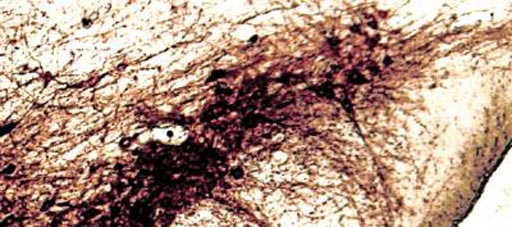Defects in Newly Identified Molecular Pathway Lead to Parkinson's Disease
By LabMedica International staff writers
Posted on 16 Feb 2017
A molecular pathway has been traced that protects dopamine producing neurons and prevents Parkinson's disease, and this finding may pave the way for development of drugs to correct defects in this pathway in individuals who have the disease.Posted on 16 Feb 2017
Previous work had demonstrated that mutations in the PINK1 (PTEN-induced putative kinase 1) gene and the parkin enzyme caused autosomal-recessive Parkinson’s disease through a common pathway involving mitochondrial quality control. Parkin inactivation was found to lead to accumulation of the PINK1 substrate, PARIS (Zinc Finger Protein 746, or parkin interacting substrate), which was shown to play an important role in dopamine cell loss.

Image: Dopamine-making cells in a mouse brain (Photo courtesy of Sung-ung Kang, Johns Hopkins University).
In the current study, investigators at Johns Hopkins University found that PARIS linked PINK1 and parkin in a common pathway that regulated dopaminergic neuron survival. PINK1 interacted with and phosphorylated PARIS to control its ubiquitination and clearance for removal from the cell by parkin.
Results published in the January 24, 2016, online edition of the journal Cell Reports revealed that conditional knockdown of PINK1 in adult mouse brains led to a progressive loss of dopaminergic neurons in the substantia nigra region of the brain that was dependent on the resulting increase in levels of PARIS.
"Mutations in the genes for both Parkin and PINK1 have now been linked to Parkinson's disease," said senior author Dr. Ted Dawson, professor of neurology at Johns Hopkins University. "Parkin is a particularly big player that seems to be at fault in many inherited cases; it is also inactivated in sporadic cases of the disease. So a drug targeting PARIS could potentially help many patients."













